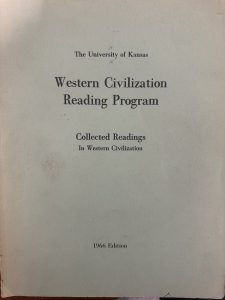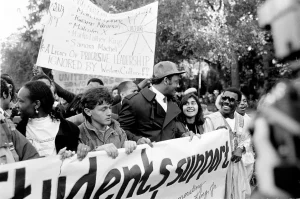When I was an undergraduate student at the University of Kansas, a requirement for graduation was a survey/readings course called Western Civilization.
Many students loathed that course.
I loved it.
Okay, no doubt I was an outlier among some of my fellow undergraduates.
The two-semester, six-hour “Western “Civ” curriculum consisted of a collection of required readings spanning more than 3,000 years of Western thought as well as weekly one-hour discussion classes in which those readings were discussed.
Sadly, as with many American universities, the University of Kansas eliminated that required course in the late 1980s when it merged Western Civ and Humanities. Western Civ was essentially dissolved in 2022 during cutbacks driven by a downturn in enrollment. Two unrequired Western Civ courses and an Introduction to Humanities course survive, both now housed in the classics department.
That seems like an awkward, if not humiliating, regression for an esteemed institution often called “The Harvard of the Plains.”
Even so, during its halcyon days between 1945 and the 1980s, the Western Civ program at Kansas exposed students to a wide-ranging array of thought, from Plato’s “The Republic” and René Descartes’s “Discourse on Method” to John Locke’s “Essay Concerning Human Understanding” and Montesquieu’s “The Spirit of the Laws;” from Charles Darwin’s “Origin of Species” and J. Bronowski’s “Science and Human Values” to Benvenuto Cellini’s “Autobiography” and Andrew Carnegie’s “Wealth.”

We even read Adolph Hitler’s “Nation and Race” and Benito Mussolini’s “The Doctrine of Fascism,” along with Sidney Ball’s “The Moral Aspects of Socialism” and William O. Douglas’s “The Human Welfare State.”
The idea was simple. Expose students to a wide range of thoughts, theories, ideas, etc., so they leave the university with a better understanding of the knowledge, ideas, nations, cultures, and peoples that contributed so profoundly to our world. It helped students to understand better the advancement of empirical science, the Industrial Revolution, the technological revolution, and the development of representative government.
In other words, it provided students with the underpinnings of a liberal and profuse education and gave them an understanding of Western Civilizations’ contributions to our world.
At some point, after students had completed the readings and the discussion sessions, they were required to pass a four-hour exam in which students were asked to answer several short answer questions and a couple of longer essay questions that obliged them to compare and contrast the ideas and concepts you were supposed to have tucked neatly away in your cranium.
I can’t recall exactly, but I was told at the time that about one-third of the students failed the exam and had to retake it. The mistake some students made was doing the readings, attending the discussion classes for two consecutive semesters, and then putting off the dreaded four-hour exam until the last semester before graduation. By the time they took the exam, much of what they had learned in the readings and discussion classes had seeped out of their overwrought brains, and their essays were little more than rambling gibberish that didn’t stand a chance of convincing even the most lenient professor that you knew the material.

So why am I prattling on about the study of Western Civilization?
Studying Western civilization permits students to scrutinize fundamental issues relating to human experiences and the human condition from a variety of perspectives, including philosophy, history, religion, literature, art, and language.
Unfortunately, few universities today offer Western Civ classes, let alone require them for graduation.
Why not?
To understand why Western Civilization classes are rarely offered or no longer required today, we must return to January 15, 1987, when race hustler Jesse Jackson and some 500 protesters marched down Stanford University’s grand main entrance, chanting, “Hey hey, ho ho, Western Civ has got to go.”

They were protesting Stanford University’s introductory humanities program known as “Western Culture.” Jackson and his deluded disciples complained that the course lacked “diversity.” They asserted that studying Western Civilization epitomized Western supremacy, colonialism, and racism.
A few faculty members demurred, arguing that Western Civ classes represented the effective academic study of the nations, cultures, and peoples that contributed so heavily to our world.
Their argument fell on deaf ears as Stanford’s administration, terrified of being labeled bigots, rushed to mollify the protesters. “Western Culture” was replaced with a politically correct course called “Cultures, Ideas, and Values” that reduced Western Civilization to an afterthought.
Clearly, the crusade against Western Civilization was more ideological than pedagogical, and the fact that it was beginning at one of America’s premier research universities carried a lot of weight.
Other universities quickly fell into line and began eliminating their own Western Civ courses—required or not. And the academic slaughter of Western Civ has not stopped.
By 2011, not one of the 50 top American universities required a Western Civilization class, and 34 didn’t even offer the course. Today, only 17% of American colleges require Western Civ, and only 18% require American history or government.
The annihilation of Western Civilization classes in our universities has left a vacuum in the study of our past. Western Civ was once used to link other disciplines, supply a forum for discussion of significant issues, and provide students with a sense of purpose.
No more.
Rodney Stark, Distinguished Professor of the Social Sciences at Baylor University and the author of How the West Won: The Neglected Story of the Triumph of Modernity, says the result is generations of students who are woefully ignorant of the contributions Western Civilization has made to our world. He adds that he isn’t optimistic that Western Civ will soon experience a renaissance.

“Americans will become increasingly ignorant of how the modern world came to be,” he writes. “Worse yet, they are in danger of being badly misled by a flood of absurd, politically correct fabrications, all of them popular on college campuses: That the Greeks copied their whole culture from black Egyptians. That European science originated in Islam. That Western affluence was stolen from non-Western societies. That Western modernity was really produced in China, and not so very long ago. The truth is that although the West wisely adopted bits and pieces of technology from Asia, modernity is entirely the product of Western civilization.
“I use the term modernity to identify that fundamental store of scientific knowledge and procedures, powerful technologies, artistic achievements, political freedoms, economic arrangements, moral sensibilities, and improved standards of living that characterize Western nations and are now revolutionizing life in the rest of the world,” Stark writes. “For there is another truth: to the extent that other cultures have failed to adopt at least major aspects of Western ways, they remain backward and impoverished.”
Of course, such verifiable statements are anathema to the woke mob and the heretical clowns who currently infest many of our universities and who are implausibly allowed to teach such pseudo-scholarly garbage as Critical Race Theory and the debunked “1619 Project.”
As a result, campuses today are battlegrounds between traditionalists who see the study of Western Civilization as a positive influence on students and radicalized professors who feel free to preach unsound notions of multiculturalism and DEI rather than the Western concepts that shaped modern theories of government, science, and aesthetics.
During a 13-year tenure as a professor and dean at the University of Illinois, I was often appalled at how little my students understood about our history and the achievements of the great thinkers of Western Civilization.
Of course, how could they be aware of these things if, during their K-12 school years, they were consistently told that the white Europeans who settled and founded America were all evil racists and Philistines who were only in North America to slaughter the indigenous population and enslave black Africans?
How could my students appreciate the intellectual giants, most of whom were of Caucasian (gasp!) European stock, and who drafted the Declaration of Independence, authored our Constitution, composed the Bill of Rights, and established a democratic Republic that is still the envy of the modern world?
The answer is simple. They couldn’t.
The fact is Western Civilization, for all its alleged faults, supplied the intellectual power and emotional stamina that produced and shaped the United States of America.

It is a legacy that should not be hidden or suppressed by revisionist reprobates masquerading as historians.
Instead, we should embrace and impart our Western Civilization heritage to all children, regardless of race or ethnicity.
As W.E.B. Du Bois wrote in his seminal book The Souls of Black Folk:
“I sit with Shakespeare, and he winces not. Across the color line, I move arm and arm with Balzac and Dumas, where smiling men and welcoming women glide in gilded halls. From out of the caves of evening that swing between the strong-limbed Earth and the tracery of stars, I summon Aristotle and Aurelius, and what soul I will, and they come all graciously with no scorn nor condescension. So, wed with Truth, I dwell above the veil.”
I can’t postulate a better endorsement of the importance and power of Western Civilization than that.
–30–
If you enjoyed this post, please consider subscribing to ForeignCorrespondent and tell your friends to subscribe. IT’S FREE! WHAT A DEAL! If you’ve received this from a friend and would like to be added to our distribution list for future blog posts, please enter your email address in the sign-up for notifications box at https://ronaldyatesbooks.com/category/foreign-correspondent.
You can also find my commentaries on Substack at https://ronyates.substack.com/ and the American Free News Network at https://afnn.us.
Please feel free to comment. WE LOVE COMMENTS!

